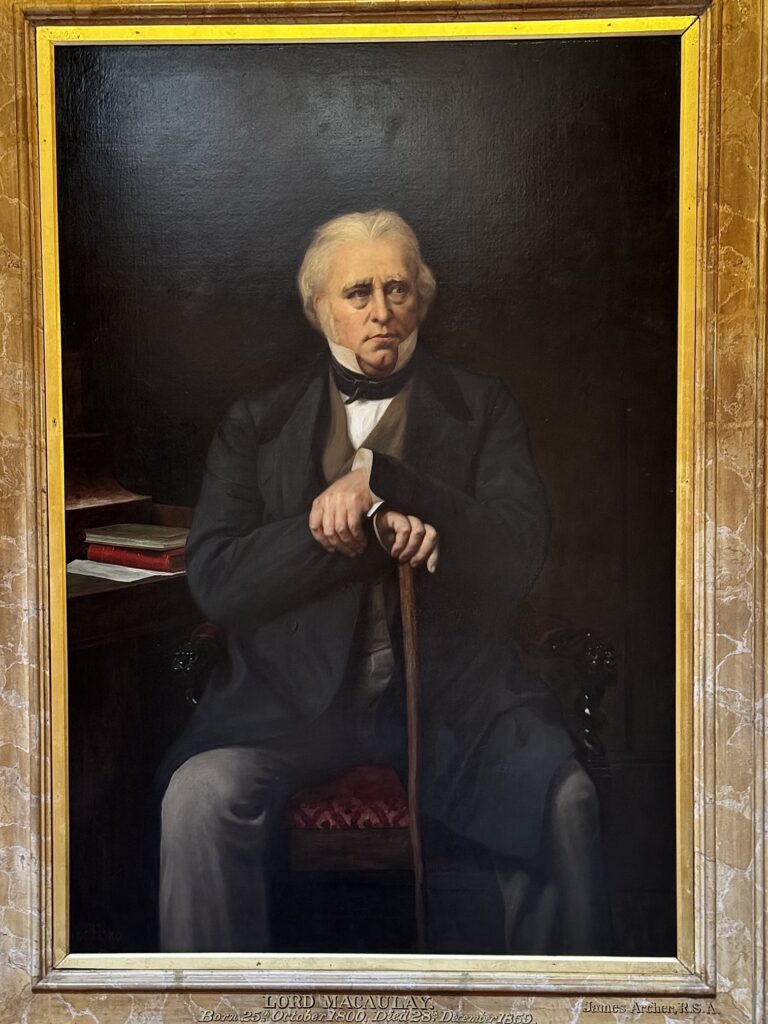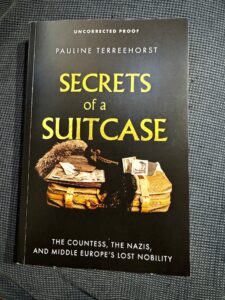A reformed character

I was a guest at lunch in the Reform Club a couple of weeks ago, and who should I see on emerging from the Coffee Room (as the dining room is perversely called) but old Tom Macaulay himself. Given that the requirement for admission to the Club is that one supports the 1832 Reform Bill, and that he was a great supporter of same, I should have guessed that his portrait would be here. The Club first opened its doors in May 1836, and is probably best known because it figured in Jules Verne’s Around the World in 80 Days.
Quote of the Day
”I have never known anyone worth a damn who wasn’t irascible.”
- Ezra Pound (who was definitely worth a damn)
Musical alternative to the morning’s radio news
Bell Harbour Reel and Maids of Mount Cisco | Mary Bergin (tin whistle) & Garry O’Briain (mandocello)
The thing that has always astonished me about Mary Bergin is how she can make wonderful music on such a simple instrument.
Long Read of the Day
Vigil
This is an extraordinary essay by Erik Hoel which has recently appeared in a collection of notable essays. Once I’d embarked on it I couldn’t stop reading.
Here’s how it begins…
I open the door while holding my son in my arms and outside there is the rabbit. It is on my lawn essentially cartwheeling, but each time it cannot move farther than a few inches. It’s too late for my son not to see it, and he’s smart enough now that if I put him back inside he’ll know something is wrong. And there’s nothing to hide from him, as there’s no blood anyway, nor any sound, just a few frantic flops across the ground before it is still.
A platonic rabbit, incredibly cute, except it’s lying on its side with one leg held suspended at an awkward angle. This is the only evidence of injury.
“Hop! Hop! Hop!” says my son, just learning to associate sounds with his favorite animals. He is smiling, and does not know how terrible it is to see a rabbit who cannot hop at all.
I approach carefully. Looking up from where it lies on the lawn its brown eye is mammalian, almost human in its wetness and soulfulness. But it’s not looking at me. The eye fixates on me momentarily, but then flits away again to resume looking beyond me. Looking up, at the sky above. It is a beautiful day out, and the sky is very blue. A few spotted clouds move slowly. One of the first days of nice weather after a long winter, with the air hinting of spring. Which is why the rabbit was out, and why it was slow and stupid and careless in these early warmer days, and why Minerva, my German Shepherd, had in the morning caught it and bowled it over, probably breaking its leg. All unbeknownst to me. She was just supposed to be going to the bathroom. And it’s not her fault. I should have watched her more closely out the window. Minerva did not savage it, she likely merely chased it, and in the chase the rabbit received a possibly mortal break…
Hope you enjoy it as much as I did.
Books, etc.

This is a proof copy of a remarkable book by my friend (and former Wolfson Press Fellow), Pauline Terreehörst. Some years ago she successfully made a bid for a vintage Gucci suitcase at Sotheby’s Amsterdam with no idea what was inside. It turned out to be full of fine dresses, furs and lace together with boxes of postcards showing castles and churches in Austria, France, England and Scotland. The owner had been an Austrian countess, Margarethe Szapáry, and Pauline — being an accomplished journalist — went digging. The suitcase turned out to be a gateway into a lost world: the social, cultural and political life that vanished in Central Europe’s great 20th century upheavals. Her book was published in Dutch in 2020 and on October 31 comes out in English.
I’m hosting a launch event for it in Cambridge at 17:30 on November 1, when Pauline will be in conversation with Nicci Gerrard (of Nicci French thriller fame). If you happen to be in Cambridge that day, why not come? Sign up here.
My commonplace booklet
The new Nobelity
The Nobel committees in Stockholm have really been stirring things up this year. First of all they have highlighted how AI is influencing (and perhaps turbocharging) some kinds of scientific research (which will annoy a lot of people who believe that ‘AI’ is much overrated). And then on Monday they gave the economics prize to three economists who have never succumbed to the ‘physics envy’ that has deformed so much theoretical thinking in the field — Daron Acemoglu, Simon Johnson and James Robinson.
The Committee praised the trio for explaining why “societies with a poor rule of law and institutions that exploit the population do not generate growth or change for the better.”
“When Europeans colonized large parts of the globe, the institutions in those societies changed,” the committee said, citing the economists’ work. While in many places this was aimed at exploiting the indigenous population, in other places it laid the foundations for inclusive political and economic systems.”
Two books by members of the trio — Acemoglu and Johnson’s Power and Progress and Acemoglu and Robinson’s The Narrow Corridor have had a particular impact on me as I ponder the impact of technology on democratic societies in our research centre and so I feel I have an intellectual debt to them and am delighted that they have been recognised in this way.
Way back in 2019 Yascha Mounk recorded a conversation with James Robinson. The transcript makes for interesting reading in the light of the award.
As an antidote, Noah Smith, who is not a fan of the economics Nobel award (and writes a blog post ever year when they come out) has pushed back on some of the work the prizewinners have done over the years.
This Blog is also available as an email three days a week. If you think that might suit you better, why not subscribe? One email on Mondays, Wednesdays and Fridays delivered to your inbox at 6am UK time. It’s free, and you can always unsubscribe if you conclude your inbox is full enough already!
